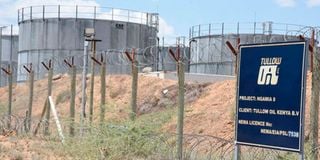Give update on touted Turkana oil find

Tullow Oil facility at Ngamia 8 in Lokichar, Turkana County, on February 18, 2020. Canadian firm Africa Oil and the French oil major Total Energies have quit, leaving Tullow Oil as the monopoly in the core product. Africa Oil is exiting to focus on production and high-potential exploration elsewhere.
I think the biggest blow Project Oil Kenya—the discovery, in 2021, of oil deposits in Turkana County—has suffered so far is the recent withdrawal of two of the joint venture partners.
Canadian firm Africa Oil and the French oil major Total Energies have quit, leaving Tullow Oil as the monopoly in the core product. Africa Oil is exiting to focus on production and high-potential exploration elsewhere.
The oil find was received with enthusiasm in anticipation of Kenyan becoming a global leader in petroleum exports. But now, many Kenyans are left wondering about the truth behind this valuable resource.
While the government has been quick to tout the potential benefits of oil extraction, including increased revenue and job creation, unanswered questions about the potential risks and costs involved abound.
One of the most pressing concerns is that the global petroleum market dealers are no longer interested in Kenya’s oil. Don’t we have a conducive environment for the petroleum industry?
According to Tullow though, the oil is adequate for commercial ventures. But is that the case on the ground or did these erstwhile partners stumble upon information that contradicts it?
Low quality oil
There is a growing worry that the oil we have is of low quality and viable to venture into the lucrative market.
I think the government owes the people of Kenya an explanation on the Turkana oil venture since they have a right to know everything about it. Questions about the economic benefits of the oil abound.
And while the government has promised that oil revenues will be used to fund vital development projects, there is no guarantee that this money will be used effectively or transparently.
There are also worries that foreign oil companies will take advantage of Kenya’s inexperience in the oil industry, negotiating deals that are not in the best interests of the citizens. Given the gravity of these concerns, it is critical that the government adequately addresses them.
It should commission an independent study to assess the environmental and social impacts of oil extraction. The results of this study should be made public with the government using them to inform its decisions on oil.
Furthermore, the government should commit to transparency and accountability in the oil sector. This could include requiring oil companies to disclose their revenue streams, ensuring that local communities have a say in negotiations and establishing an independent body to oversee oil operations and ensure they are conducted in an environmentally responsible manner.
The truth about Turkana oil is complex and nuanced. While there are potential benefits to oil extraction, there are also significant risks. It is time the government came clean on these risks and worked with Kenyans to ensure that oil extraction is done responsibly and transparently.
Only then can we ensure that the benefits of Turkana oil are truly realised and our natural resources are preserved for future generations.
Felix Kyalo Musyoki, Kisumu




